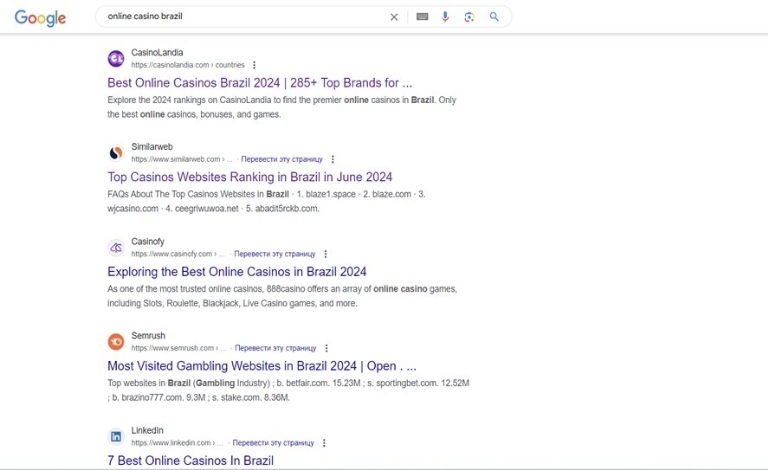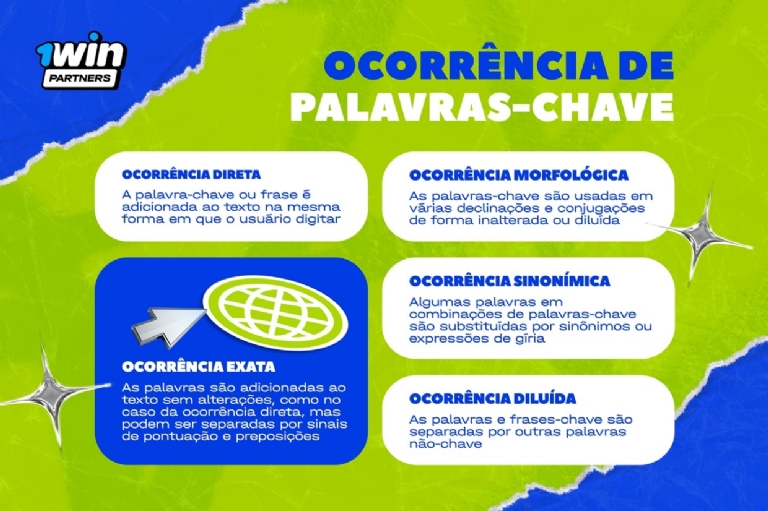

Don't forget to follow us on social media for the best iGaming tips: Instagram, Telegram, YouTube, X, Threads.
What are keywords and semantic core?
Semantic core - a set of words and phrases used to describe the topic of the website. It is fundamental for promotion and is the starting point for any successful project. After all, without it, you cannot run contextual advertising and create an SEO strategy. Additionally, a structure based on the semantic core helps search engines better classify information and show users relevant results.
The words and phrases included in the semantic core are called "keywords." Simply put, these are the words that users use when searching for information on Google or Bing, for example.
How do keywords work?
It's easier to show how all of this works with a concrete example. For instance, we want to play at an online casino, but we don't know which one. So, we enter this exact query into the search box and we see the following.

Why did Google choose these sites? After all, thousands of sites on similar topics operate and are advertised in Brazil every day. It's very simple: the owners of these sites filled them with keywords or paid the search engine to advertise the correct query, so the service would display them first.
Adding keywords to the page is called SEO optimization, and the paid display of that page for a specific query is contextual advertising (actually, based on this principle and a traffic source like PPC).
But to appear in the search engine, it's not enough to scatter keywords thoughtlessly across the site. They need to be competently combined, organically embedded into the site's content, and always maintain a list of relevant keywords. All this significant and meticulous work yields results after a few weeks or even months. But it's worth it because the quality of this traffic is often superior to that of Facebook.
Types of keywords

Traditionally, in SEO, keywords are categorized according to how frequently users use them to search for information.
1. Low-Frequency Queries - These are usually narrowly focused queries entered into the search engine no more than 200 to 300 times per month. These queries offer a good conversion rate due to their specificity and ability to meet specific needs. Additionally, due to low competition, advertising for such queries is inexpensive.
2. Medium-Frequency Queries - These queries are searched between 200 to 300 and 1,000 to 1,500 times per month. Typically, these queries include additional details, such as “how to play poker online.” In the context of a casino, they usually involve details about specific slots or bonuses.
3. High-Frequency Queries - These are entered by tens and hundreds of thousands of users. Generally, they are simple and general queries, composed of 2 to 4 words, such as: online casino, best betting sites, best online casino, etc. Advertising for these queries is the most expensive, and search engine optimization is the most challenging because a large number of companies want to display their pages for these queries.
Inclusion - the type in which keywords occur in the text can also be divided into several types:

* Direct Occurrence - The keyword or phrase is added to the text in the same form as the user typed.
* Exact Occurrence - The words are added to the text without changes, as in the case of direct occurrence, but they can be separated by punctuation marks and prepositions.
* Diluted Occurrence - The keywords and phrases are separated by other non-keyword words.
* Morphological Occurrence - The keywords are used in various declensions and conjugations, either unchanged or diluted.
* Synonymic Occurrence - Some words in keyword combinations are replaced by synonyms or slang expressions.
How to select keywords?
You can select keywords manually or with the help of artificial intelligence.
If you want to do it manually, you need to think about what people are searching for and write everything that comes to your mind in a separate document. This can also help the search box, or rather, the hints that it automatically gives you when you enter a query.
But if there are a lot of pages for advertising, manually collecting keywords can take a lot of time. Therefore, it is worth using apps that simplify this task. There are free and paid ones, but they all help with similar things:
* help select keywords with certain words
* filter high-frequency, medium-frequency and low-frequency queries
* show competitor keywords
* remove irrelevant keywords
* divide words into different groups and subgroups
* save all this in a separate file, if necessary.
When choosing a service, you need to consider which search engines it works with and what functionality it offers.
Where and how to insert keywords
Keywords can be inserted in any section of the website, from the description to the contact information and the “about the company” block, if any.
Working keywords can also be inserted in:
* Page title and description
* Website or page URL
* Alt tags on images
Words in the text should be evenly distributed and not two similar words should be next to each other. This makes the text less natural. Also try to make sentences syntactically correct and logical, so that the keywords do not stand out against the rest of the text.
Also, do not overload the text with keywords. This will harm both communication with the audience and SEO optimization. Search engine algorithms have long been able to identify texts with unnatural keyword spam, and such sites are demoted in the search results.
There is no specific standard for the number of keywords in the text. But on average, the number of keywords should not exceed 4-5% of the total text volume. With this ratio, the website page does not suffer from spam and has every chance of reaching high places in the search results.
Conclusion
Summarizing what has been said above, we can affirm: keywords are necessary for the search engine to classify the site for specific queries, which, in turn, are divided into high, medium, and low frequency. Keywords can be included in the text without changes and with the addition of punctuation marks or other words. The insertion of keywords can be done in any section of the site, as long as it appears organic.
If, after reading this article, you want to work with search engine traffic (SEO/ASO/PPC) or already work with it, write to the manager at 1win Partners so we can discuss the terms of cooperation and start transforming your traffic into money.
Source: 1win Partners